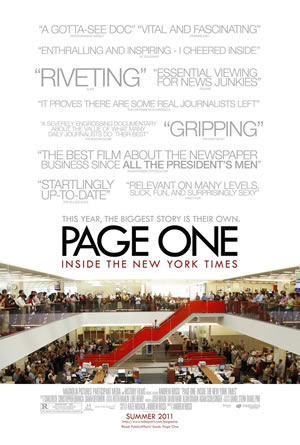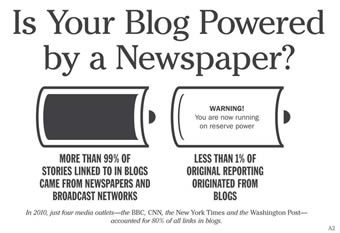Movies

New Releases • A-D • E-H • I-P • Q-Z • Articles • Festivals • Interviews • Dark Knight • Indiana Jones • John Wick • MCU
 Hot off the press: Page One
Hot off the press: Page OnePhoto: Magnolia Pictures
Page One: Inside The New York Times
Directed by Andrew Rossi
Rated R
With the journalism profession in the crosshairs of obsolescence and under pressure to find a sustainable new business model in the digital age, Page One: Inside The New York Times is a documentary that takes a look at an old industry enduring a period of tremendous uncertainty. But, to use an old journalism expression, it doesn't sing.
Start Spreadin' the News

There are a few different stories running through Page One's 88 minutes. At the top level is a fly-on-the-wall look at a few "page one" meetings inside the inner sanctum of The New York Times. Those are the editorial meetings in which the editors lobby for their stories to get on page A1, the front page, page one.
Another story follows David Carr, a dyed-in-the-wool Times reporter who was a down-and-out crack addict before turning his life around. Carr is the star of the doc; he's a compelling individual with his own story to tell and a devout appreciation for what the Times has to offer. There's also Brian Stelter, the anonymous blogger behind TVNewser whose work earned him a job at the Times.
While they are the stars of the show, Page One also covers some of the black eyes, like Judith Miller's Iraq reporting based on bad information, and Jayson Blair's full-out plagiarism.
Those stories help give a sense of what it's like working at the Times and the characters who populate the cube farms and offices down at the splashy new Times tower.
The movie also includes a look at some of the newspaper's more controversial endeavors, including the Pentagon Papers, the documents about the Vietnam War published in the Times that helped ignite the wrath of President Nixon. That was the '70s. Those papers segue to events of the past year, when similar ire was stoked while the Times collaborated with Julian Assange and published key selections from his WikiLeaks site's immense cache of hundreds of thousands of confidential materials.
Missed Print
All of that information is good. It helps give a sense of what the country's most famous newspaper is about.
But in a lot of respects Page One feels like a newspaper movie made for newspaper people. The documentary doesn't go far enough in covering the significant differences between bloggers and professional, trained, and educated journalists.
Sure, Carr goes on an aggressive push-back when the folks at Vice talk about how hip they are and how they appeal to a younger audience, one that partners such as CNN crave dearly. Carr points out Vice's coverage of a guy in a safari hat looking at poop on an African beach pales in comparison to the entrenched war coverage provided by the Times. +1 for Carr.
The demarcation could've been made even more stark. Perhaps a year or so ago, one of the founders of a popular tech blog was interviewed on CNN's Reliable Sources and this individual explained he had no journalism background and had no concept of how a writer could possibly be objective; he seemed to have no grasp of what the word "objective" even meant. His writers write what they want and what they think and that's that. Accuracy be damned. That would've been good footage to help explain the evils of the blogosphere – it's really not about the facts.
Carr does, though, take on Newser founder Michael Wolff and Markos Moulitsas, founder of the Daily Kos. It's a joy to see Carr slice-and-dice Wolff, who makes the claim that journalists are totally unnecessary. Then Carr deftly makes the point that without journalists, Newser would have virtually no content because Newser – and so many of those other news aggregators out there – simply reuse articles sourced from other publications, including old-school journalism outlets.
Good on you, Carr!
Alas, there's so much more that should've been said in order to inform and educate the great unwashed in America and beyond as to the larger role journalism plays in maintaining an informed and safe community. Part of the industry's problem is the public's perceived lack of value provided by the "old school" style of researched and vetted reporting.
Google Is Evil
What ails journalism today runs even deeper than the blogosphere and the blinded public at large. Google's tapped key advertising revenue and craigslist has soaked up the classifieds, the primary sources of newspapers' revenue stream. Subscriptions simply help recoup the cost of production.

David Carr at work
Photo: Magnolia Pictures
Page One touches on, but glosses over, a wound all of the major media players inflicted on themselves: 10+ years of giving away the store by allowing free access to their articles online. Page One does include mention of the Times' recent move to a paywall structure, a threshold that requires non-subscribed readers pay for articles after they view a very generous 20 articles for free during the calendar month.
But it's like trying to herd cats. "Old" media has to contend with a younger generation that is used to getting everything for free online; for many people there's no hesitation to visit sites offering pirated music and movies. And, heck, newspapers have been putting their own content online for free, why should anybody have to pay for that now?
The news aggregators and Google only make things worse by disregarding copyrights and failing to share the wealth they accumulate with the material creators that are the backbone of their end products.
Ultimately, Page One is a good conversation starter, but it isn't focused enough and doesn't have the feel or the draw of the best big-screen documentaries. That said, hopefully it'll find a broader audience via all the assorted home video outlets and from there ignite a greater awareness of why newspaper-style journalism must continue, regardless of the physical medium through which it is presented.
# # #
Full Disclosure: Matt Anderson has a degree in journalism, is a subscriber to the Sunday Times, and has full, unfettered access to the Times online. He shudders at the thought of a world without The New York Times.
• Originally published at MovieHabit.com.



